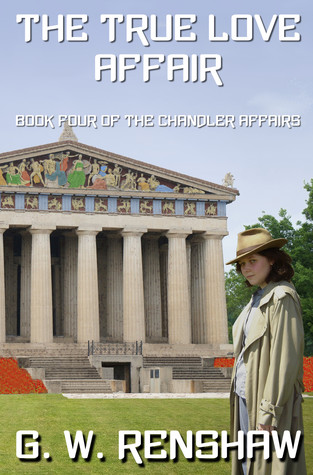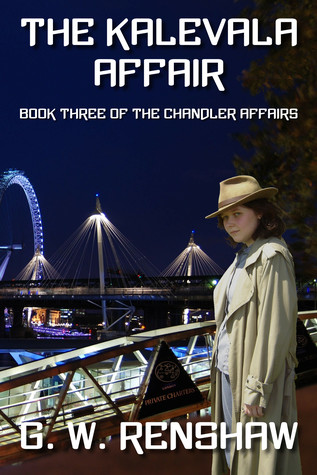"While this can be considered a Y.A. book, I wouldn't recommend it to young teens. The action is fairly fast paced and there are several scenes of unconventional sexuality which are dealt with in a straight forward manner. No polite fade to black here.
Final opinion? Would I recommend this to my 16 year old son, maybe not. Am I going to read the rest of the series? Definitely!" - Sandra, Goodreads
The Stable Vices Affair
Veronica Chandler has worked hard to become a private investigator. At the age of eight she got a baton for Christmas—just like Mummy’s. At 12, she started working at her father’s restaurant so she’d have the money for the investigator’s course. At 16, she became an intern with the Calgary Police Service. And now, at 18, she's the youngest licensed PI in Alberta.
As her ex-boyfriend can attest, she has the skills. As a psychotic killer discovers, she has the will. Now she’s ready to take on the world: To find the lost and expose the faithless.
None of which prepare her for a house that can’t decide whether it’s empty, one or two perverse dwarfs with a bizarre hold over their victims, a kinky pony show, and a secret global organization. Every clue leads to more questions. Four lives depend on Veronica finding the answers.
And then there’s that pesky losing-your-soul thing.
Alyssa Blakeway is so submissive it’s a miracle she left her house, let alone asked Veronica to find out if her abusive husband is also cheating on her.
When Veronica finds out who Collin Blakeway is actually going to see, things go from bad to worse to deadly. They also challenge Veronica’s most deeply held beliefs as she discovers that demons and magic are real.
It’s no longer a matter of saving a marriage. Now she has to save the lives of Alyssa, her sister Kali, an unknown woman, and herself. All while avoiding being killed by her sister for acting stupidly.
If an arborist, a coven of Witches, the Vatican, the Freemasons, a Native Elder, and an old bicycle can’t save them, who can?
Being shot at and landing in protective custody certainly cramps a PI’s style, so when a group of collectors want Veronica to track down an historical artifact in England, she jumps at the chance. They’ll even handle recovery, so all she has to do is find the item. It’s a piece of cake.
There are a few details that were left out. Everybody is after this thing. Veronica has to dodge bullets meant for another PI, get chased all over Europe by Finnish terrorists, tries not to violate every national park in the world, and has to put up with an English investigator who insists on accompanying her.
Of course, the artifact turns out to be more dangerous than she was led to believe. Veronica has to trust somebody who tried to remove her head, decide the fate of the world, and survive an angry volcano. At least she’s getting paid for it. If she can collect.
Veronica has just gotten home after solving a minor case in Mexico involving kidnapping, betrayal, bank fraud, and a Colombian drug cartel when an old acquaintance show up to hire her. Somebody has been committing impossible murders all over the world, and Veronica is the only person qualified to stop the killer before the body count soars.
The problems start with her client. Can she trust a demon prince not to send her back to therapy or worse for another year? What, if any, is his hidden agenda? Is anything at all as it seems?
Veronica thought she had a handle on magic and demons, but as soon as she starts investigating it’s obvious that all the rules have changed. She’s playing in the big leagues now, and she’s going to have to move heaven and hell to keep humanity alive. Starting with herself.
Now, if she can only survive dinner with her family, a blind date, a small immigration problem, and working with the federal cabinet, it’s possible that all will be well.
Or at least as well as it can be when you have to deal with insane immortals and a talking cat.
GUEST POST
Research is Not a Four-letter Word
I hate reading something by an author who doesn’t get the details right. There’s a novel set in my home town that describes a car making a turn that is physically impossible. Most readers won’t spot the mistake, but those who live here will and it’s irritating. You don’t want to irritate your readers unnecessarily.
I go the other way. I over-research everything.
I know that Calgary police cars have air bags, that the dispatch computer is mounted between the front seats, and that there’s an interior trunk release lever. Does it matter to most readers? Probably not, but I it gives me a warm, fuzzy feeling to know that police officers who read the car crash scene don’t throw the book across the room in disgust.
That’s great for you, I hear you saying, but who really cares? Doesn’t lots of picky detail get in the way of the story?
It can. Nobody wants to read twenty pages of magical ritual when you can do the same thing in a few sentences or paragraphs. “He carefully drew the circle in chalk, put on his robe, and began the long-winded incantation. An hour later, the demon appeared in the triangle outside the protective circle.” Done.
But this description is so minimal that it doesn’t give the reader a sense of what’s really happening. The original sources are readily available from bookstores, libraries, and online. It can add to the atmosphere if you quote the first few sentences of the actual incantation to show your readers how tedious it really is. Read the original descriptions of the demons that can be summoned so you know how they act. Once you have the details, you can leave most of them out, but the ones you keep will make your readers think, “wow, this guy really knows his stuff.” And that will help sell the actual fiction. Why do you think so many horror movies say they are “based on true events” even though they aren’t? We’re much more involved if we think it could happen in real life.
What do you research, and how?
Start by questioning your every assumption. I wondered if there were PIs in Alberta (yes), and looked at licensing requirements. Wow, I can have the world’s only legitimately licensed teenage PI if her experience makes that plausible!
Every PI calls a police contact to get information for them. Nope, not in Canada. The Freedom of Information and Privacy Protection Act forbids cops from looking up information not related to their assigned cases. Bummer? Not really, because it means I have to get creative about how my PI gets her information. That’s much more interesting.
Canadian PIs can’t carry firearms, so mine carries a baton. The requirement that she re-certify every three years can get in the way of doing something else and cause consequences.
What does a place look like? Start with Google Maps, satellite views, Street View. Look for photos posted online. Look for web sites about the place. You can find out what a place looks like, whether there’s on-street parking, whether the road is paved, whether there are hiding places, and more. Pay attention to one-way streets, because those can really screw up a car chase. Or stop the bad guy cold if he turns the wrong way and meets a bus head on.
Look up people or things associated with what you are writing to get ideas. I have an archaeology professor named Schliemann because that’s amusing to archaeologists. Look up meanings of names. I have a Finnish professor named Seppo who is an expert in an epic poem about a magical blacksmith. Seppo means blacksmith in Finnish. Look at the culture of the area. For that you will need not only written sources but also people who live there. I’m proud that I wrote a scene in Finland so well that a resident said I have a Finnish soul.
That is a reader who will stick with me, and it’s all due to research.
About the author:
G.W. Renshaw lives in Calgary, Alberta with his lovely wife and Romulus the cat. He likes to write stories that range from the unusual to the bizarre.
He has picked up a variety of skills over the years: gunner in the Canadian Forces, practitioner of Iwama-style Aikido, Krav Maga, and Chito Ryu Karate, computer programmer, Linux druid, Search and Rescue manager, caving, rock climbing, and archery. He learned man tracking from Terry Grant (the original ManTracker on TV). He also learned a variety of medieval skills while in the Society for Creative Anachronisms.
G.W. writes when he isn’t maintaining the web site for When Words Collide, being beaten senseless by his young padawan, or working at Mount Royal University, the University of Calgary Faculty of Veterinary Medicine, or the Cumming School of Medicine.
He claims to have a firm grip on reality, but seems unaware that it is slowly turning purple. He will happily watch just about any film with monsters in it.






Excellent guest post! I really enjoyed reading it! This book series sounds very intriguing! Looking forward to checking these books out!
ReplyDeletelove the excerpt, the good sounds great
ReplyDeleteWow, I really like the detail that went into the research of a PI in Canada. While "artistic license" is also fine, I can appreciate the detail of the research.
ReplyDelete